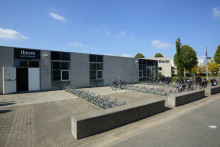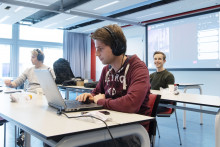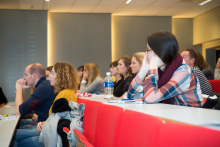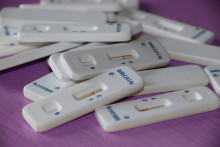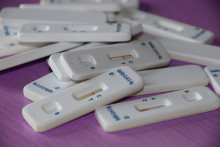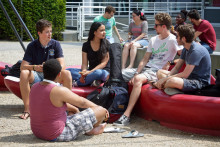The Centre for Educational Support (CES) receives 'incidental' signals from students about situations that were experienced as unsafe, says interim director Katja Hunfeld. ‘But the UT abides by the rules of the government. Everyone wears face masks, there is sufficient ventilation in the rooms, we keep a distance of one and a half metres and there is crowd control during the exams. Yet, it's human work. It is possible that someone does not keep a safe distance. That can happen. We can't do more than address people about their behaviour.’
According to Jochem Grashof, a second-year mechanical engineering student, the risk of spreading the virus is small as long as everyone sticks to the rules. ‘Before I started my exam, I had to fill in a questionnaire about corona-related complaints and possible contacts with infected people. The ideal situation is that everyone fills it out truthfully. I estimate that at my first exam, at the beginning of October, there were about 300 people in the same hall. But the situation was different back then. It was before the stricter measures were taken. I myself am quite down-to-earth and did not feel unsafe. However, I was surprised when we were allowed to go outside after the exam. That happened simultaneously, while I thought it was going to be row by row. Something like that could have been better.’
COVID symptoms
Max (he prefers not to mention his surname, ed.) is a second year Advanced Technology student and didn't go to his exam because of a roommate with a fever. ‘At first I was told that I could take a resit in January, but that would be exactly in the exam week of the next module. After a lot of e-mails I managed to take the exam in this period.’ According to Max, not every student is equally responsible with regard to the obligation to stay at home. ‘I am one hundred percent sure that some students are faking their answers to the questionnaire in order to be allowed to take the exam anyway. I get it somehow: the alternative, a resit at a different time, is sometimes just super-inconvenient. But I would never do it out of principle alone.’
The rule is clear: students who have corona-related complaints, or who may have had contact with a corona patient, are not allowed to come to the test. But what about their resit? ‘That is regulated per study programme,’ says Hunfeld. ‘They make an arrangement with the students. Staying at home with complaints shouldn't be an obstacle, of course. We want to prevent students with mild complaints from coming to campus, fearing that they might miss an opportunity.’
Short notice
Education was not affected by the most recent rules. According to Hunfeld, the press conference did result in discussions about examinations in even smaller groups. ‘But that did not work out in all cases. It was just too short notice for that. If we change things at the last minute, you are faced with major uncertainties, such as teachers or students who are in the wrong room and miss the exam. And sometimes there is simply no room for them. Not all exams are under a hundred, but that's not against the rules. In such cases, I do understand the perceived feeling of unsafety among some students.’
Next week the final exams will take place as planned. It remains to be seen what the next press conference will mean for education. CES is working on different scenarios, Hunfeld says. ‘For example, a roadmap of the VSNU (Association of Universities in the Netherlands, ed.) will soon be published. It will state what can or cannot be done in each situation. Together with LISA, we are also speeding up online proctoring, so that students can safely take their exams at home. This may offer a solution for people with complaints. Above all, I hope that we can bring this examination period to a successful conclusion. Mind you: it's a huge operation for our timetablers.’


